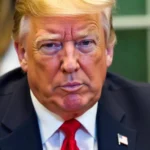In a move that has sent ripples across Washington, former Hawaii Representative and military veteran Tulsi Gabbard has officially taken charge as the Director of National Intelligence (DNI). Confirmed by the Senate in a contentious 52-48 vote, Gabbard’s appointment marks a significant shift in the leadership of the United States intelligence community. As she steps into this critical role, she has vowed to reform and refocus the intelligence apparatus to align with President Donald Trump’s vision of a more efficient and accountable intelligence system.
A Controversial Appointment
Gabbard’s confirmation was far from smooth. Critics, particularly among Democrats, voiced concerns over her past statements and actions, including her meeting with former Syrian President Bashar al-Assad and her prior defense of NSA whistleblower Edward Snowden. Senate Minority Leader Chuck Schumer strongly opposed her nomination, citing her “disturbing” record on national security matters and her alleged tendency to echo Russian propaganda. Even within the Republican Party, her appointment was met with skepticism, with Senate Minority Leader Mitch McConnell being the sole Republican voting against her, warning that her “lapses in judgment” could compromise the integrity of intelligence briefings.
A Military Veteran with Unconventional Views
Despite the opposition, Gabbard’s extensive military experience and her status as a former Democratic presidential candidate in 2020 provided her with strong credentials. A Lieutenant Colonel in the National Guard, she served two deployments in the Middle East and has been a vocal advocate for non-interventionist foreign policies. Many Republican senators ultimately backed her appointment, convinced by her commitment to depoliticizing the intelligence community and returning its focus to core intelligence-gathering functions.
Trump’s Endorsement and Musk’s Influence
President Trump, who was present at her swearing-in ceremony at the White House, praised Gabbard as a “courageous and often lonely voice for truth.” He emphasized his trust in her ability to lead intelligence agencies without the influence of what he has often termed the “deep state.” Notably, tech mogul and Trump ally Elon Musk played an indirect role in securing Gabbard’s confirmation by leveraging his social media influence. He publicly criticized Senator Todd Young, who had initially expressed concerns about Gabbard’s nomination, ultimately leading Young to support her appointment after a private discussion.
Reforming the Intelligence Community
Gabbard’s first public remarks as DNI signaled her intent to reform the intelligence community, a move that resonates with many conservatives who have long criticized the agency’s alleged overreach. She pledged to rebuild public trust, stating, “The American people have lost confidence in our intelligence agencies due to years of politicization. My mission is to restore integrity and refocus our efforts on protecting national security without bias.”
One of her primary objectives is streamlining intelligence operations to eliminate inefficiencies. Reports indicate that staff at the CIA and other agencies have been offered buyouts, sparking concerns about a potential downsizing of intelligence personnel. Additionally, discussions about increasing private-sector collaborations—potentially involving Elon Musk’s Department of Government Efficiency—have raised both hope and alarm.
National and Global Security Challenges
Gabbard assumes her role at a time when the intelligence community faces significant global threats. From the ongoing conflict in Ukraine to rising tensions in the Indo-Pacific, the DNI’s role in shaping U.S. foreign policy is crucial. Gabbard has expressed skepticism toward broad surveillance programs such as Section 702, which allows intelligence agencies to collect foreign communications data. While some see this as a commitment to civil liberties, others worry that it could limit intelligence-gathering capabilities.
The Road Ahead
While Gabbard’s appointment represents a bold shift in the intelligence community, her tenure will likely be tested by both domestic and international challenges. Her leadership will be closely scrutinized, especially in the wake of ongoing cyber threats, terrorism concerns, and geopolitical instability.
With both strong supporters and vocal detractors, Gabbard’s success as DNI will ultimately depend on her ability to navigate the complexities of national security while maintaining the trust of both the administration and the intelligence community. As she takes charge, all eyes will be on how she reshapes one of the most critical sectors of the U.S. government.
For more insights on high-profile political cases, check out the latest on Steve Bannon’s court appearance here.







